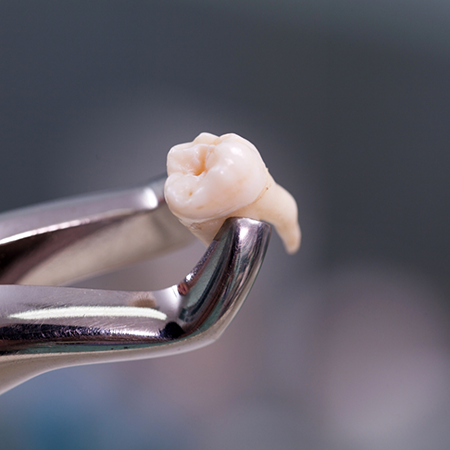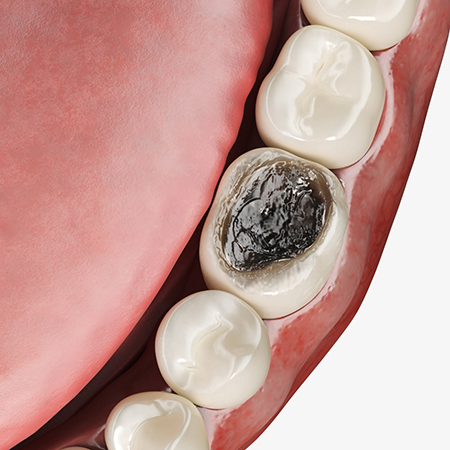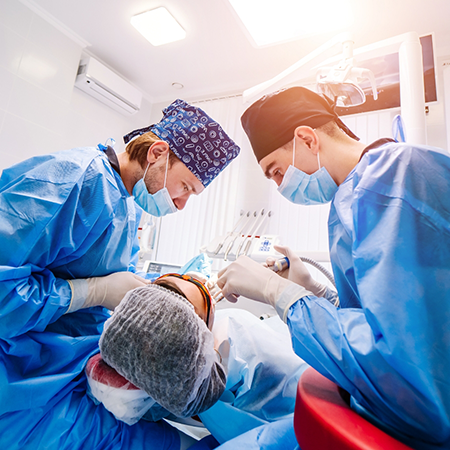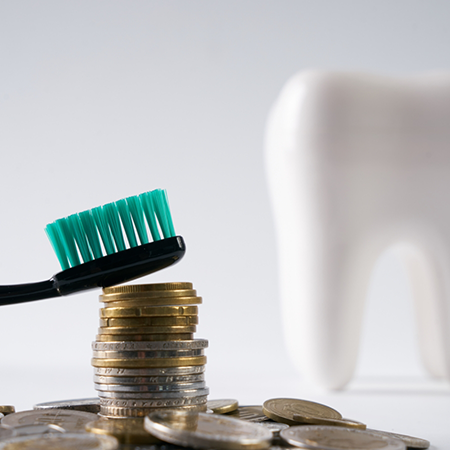Tooth Extractions Allen
We Can Remove Teeth Safely & Comfortably

As a professional prosthodontist, Dr. Kar understands how important it is to have a healthy, beautiful set of teeth. When a damaged tooth, a pained wisdom tooth, or extra baby teeth get in the way, it can be a major deterrent to your overall oral health. If you ever need a tooth extraction in Allen, Advanced Dental Care of Allen is here to restore your beautiful smile! Not only are we very careful about deciding which teeth need to be extracted, but we can also remove teeth safely and comfortably.
Why Choose Advanced Dental Care of Allen for Tooth Extractions?
- Highly Experienced Dental Specialist
- Multiple Types of Sedation Available
- Compassionate & Careful Team
Reasons Why Tooth Extractions Are Necessary

There are a number of reasons why our team might recommend that you get one or more teeth removed:
- A tooth is damaged or decayed to the point where attempting to restore it would not be practical.
- It is necessary to make room in your mouth for orthodontia or dentures.
- A tooth is impacted (stuck beneath the gumline). This is often the case with wisdom teeth.
- A tooth is infected, and it must be removed so the infection does not attack nearby tissues.
- A baby tooth did not fall out in a timely manner, and removing it is necessary for the health of incoming adult teeth.
The Process of Removing a Tooth

There are two types of tooth extractions:
- Simple Extraction Procedure – A simple extraction is commonly recommended when a tooth is easily accessible in the mouth. The tooth is loosened with an instrument called an elevator and is then removed with forceps.
- Surgical Tooth Extraction – More complex than a simple extraction, a surgical tooth extraction is often recommended if the tooth has broken off below the gumline or has not yet surfaced (as is often the case with the wisdom teeth).
Regardless of which type of tooth extraction you undergo, you can anticipate a comfortable procedure. Thanks to local anesthesia and sedation, you may feel little to nothing during your appointment.
Tooth Extraction Aftercare

Here are a few tips to help you enjoy a smooth recovery after your tooth extraction procedure:
- Get plenty of rest.
- Take any medications recommended by Dr. Kar, such as pain relievers or antibiotics.
- After the initial 24 hours, start regularly rinsing your mouth with warm salt water.
- Do not smoke.
- Do not drink through a straw.
- Prop up your head on pillows while sleeping.
You should also attend all recommended follow-up appointments. If you plan to get a tooth replaced, timing is important; waiting too long to get a dental implant or bridge could complicate the details of your case.
Understanding the Cost of Tooth Extractions

The cost of a tooth extraction, along with associated care, can vary from case to case. It depends on a number of factors. Our team will be sure to provide a personalized price estimate when we are discussing your recommended treatment plan. With the help of insurance, financing, and/or our in-house dental savings plan, most patients find that the cost of their extraction procedure is quite easy to manage.
Factors That Can Affect Tooth Extraction Cost

Some factors that can influence the cost of tooth extractions include:
- Which tooth needs to be removed. Due to their location in the mouth, some teeth are more challenging to remove than others. Therefore, they incur higher fees.
- The number of teeth that need to be extracted. Logically, the removal of one tooth costs less than the removal of several.
- The overall complexity of your case. If your tooth is impacted or there are other complicating factors in your case, you can expect a higher total bill. In some instances, Dr. Kar partners with another local specialist to handle complex situations, which can further affect the total cost of your treatment.
- Additional care. If you choose to be sedated during your procedure, that will be reflected in your financial obligation. After an extraction, tooth replacement can also increase the total cost of your care. There are different types of sedation and tooth replacement, which can naturally have a bearing on cost.
Does Dental Insurance Cover Tooth Extractions?

In most cases, dental insurance covers a portion of the cost of tooth extractions. For simple extractions, about 80% of the cost may be covered. If you require a surgical extraction, only 50% of your bill may be covered, up to the amount of your policy’s annual maximum. Our practice welcomes insurance, and we will assist you as you seek to derive the greatest value possible from your benefits.
Other Options for Making Tooth Extractions Affordable

Beyond insurance, there are a couple of provisions that might make it easier for you to afford your extraction procedure:
- We accept financing through CareCredit, Cherry and Sunbit. The application process is fast, and most patients are eligible for an affordable, low-interest payment plan.
- Our in-house savings plan. Our in-house savings plan is designed for patients without insurance. It covers all preventive care and provides a substantial discount on other services. In fact, it could reduce your tooth extraction cost by up to 40%. Signing up is easy, and you can start using your benefits right away!
Would you like to learn more about the cost of tooth extractions? Our Allen dental team would love to speak with you — get in touch with us today!
Tooth Extraction FAQs
How much does a tooth extraction cost?
The cost of a tooth extraction in Allen depends on whether it is a simple or surgical exaction. The type of sedation used and insurance coverage can also affect your financial obligation. Our team will be sure to give you a cost estimate before you commit to any type of treatment. We’ll also be glad to file insurance claims on your behalf.
How long does it take to recover from a tooth extraction?
The soft tissue at the site of an extraction heals fairly quickly. With a simple extraction, your mouth may be feeling normal within a few days. For a surgical extraction, any soreness you experience should be greatly diminished within 7 – 10 days. You can facilitate a smooth healing process by avoiding hard and crunchy foods and adhering to excellent oral hygiene habits. You may also take painkillers to ease any discomfort.
How can I avoid dry socket after a tooth extraction?
Dry socket is a relatively rare complication wherein the blood clot at the site of an extraction gets dislodged (or fails to form). You can minimize your risk of dry socket by diligently following Dr. Kar’s post-op instructions. For at least a few days, you should not smoke, avoid the use of straws, and consume soft foods.
How soon can I replace an extracted tooth?
The timeline for tooth replacement following an extraction varies from patient to patient. In most cases, it is best to wait several weeks or a few months to give the bone at the site of an extraction an opportunity to heal fully. In other instances, such as if a patient is receiving All-on-4 dental implants, extractions and took replacement might happen on the same day.
Are there any alternatives to tooth extractions?
Dr. Kar views tooth extractions as a last resort. He will make every effort to preserve your natural teeth before he recommends that any of them be removed.
